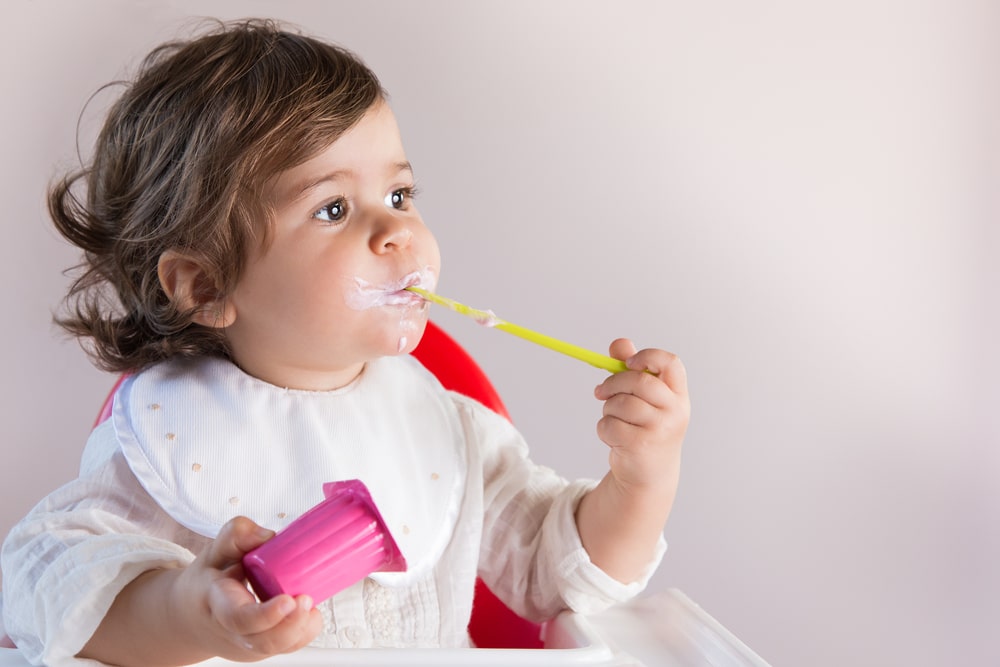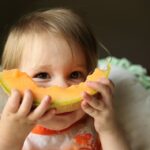Ensuring that our children eat well with plenty of variety and healthy foods is definitely one of the most stressful parts of being a parent.
We do all the right things when we start weaning and our children often lull us into a false sense of security by eating everything we put in front of them.
Then bang they suddenly decide that the food you are offering is just not good enough. And then to add to that they start not only not eating the food you offer but they are actually spitting it out.
The first thing is don’t panic your cooking is really not that bad! So why is your toddler spitting out their food and what can you do to help them get past it. Read on to find out all the top tips we have to offer.
When Should My Baby Be Able To Eat Real Food Properly?
This is not a one answer fits all kind of question as there are different factors to consider such as the stage of development, fine motor skill development, and food is another milestone that they have to achieve in their own time.
The average baby achieves eating solid food in this order of milestones, but this is not written in stone.
4-6 months
This is the age that the American Academy of Pediatrics recommends that you introduce solid food. By this age, they are beginning to lose the tongue-thrust reflex and can hold their heads up independently.
9 months
This the age when they are ready to move on from pureed foods to chunks. This does not mean that you should jump straight to rice cereal but they can handle a little more texture in solid foods.
Introduce new textures slowly, good options to start with are things like mashed banana or mashed avocado.
Can now sit in a highchair
Once your little ones are able to sit in a high chair. This is a huge milestone and shows that your baby is definitely ready to be eating solid foods.
[amalinkspro type=”showcase” asin=”B071LQDX2C” apilink=”https://www.amazon.com/dp/B071LQDX2C?tag=mominformedcom-20&linkCode=osi&th=1&psc=1″ new-window=”true” addtocart=”false” nofollow=”true” sc-id=”4″ imgs=”LargeImage” link-imgs=”false” specs=”7 growing stages even include a toddler table and chair: Infant high chair, fully featured, infant booster, portable toddler booster, toddler youth chair, toddler table & chair, seat two children simultaneously~~~Infant high chair reclines to provide a comfortable space for baby; Infant Booster brings baby right up to the table~~~The highchair becomes a toddler sized table and chair; Toddler Chair and Booster Chair allow you to seat 2 children simultaneously” btn-color=”#ff9900″ btn-text=”Buy on Amazon” alignment=”aligncenter” hide-prime=”0″ hide-image=”0″ hide-price=”0″ hide-button=”0″ width=”750″]Graco Table2Table Premier Fold 7 in 1 Convertible High Chair[/amalinkspro]
7-11 months
At this age, they usually tell you that they are ready to try some more solid foods by trying to grab anything that you are eating. Almost any food that is healthy, and has a soft texture is a good finger food if it is cut into small enough pieces.
Things like diced pasta, small pieces of well-cooked vegetables such as carrots or peas. Pea-sized bites of chicken or other soft meat, cereal puffs.
Start using a spoon
Almost as soon as you start feeding your child with a spoon they will try and grab it out of your hands. But that doesn’t mean that they can actually do it, or that they find their mouths every time.
It’s not usually until after their first birthday when babies really get to grips with using a spoon effectively.
Once they are a little more confident with the spoon and have a pretty good chance of actually getting it at least close to their mouths, you could try giving them foods that are thicker and sticky as they stand a better chance of staying on the spoon.
By around, 18 months
By this age, most toddlers can eat real food properly. You will still need to make adjustments for them.
These changes can be such as cutting things up small enough for them to eat or swapping out certain ingredients that are not accessible such as meats like steak or pork that require a little more chewing than they can yet handle.
Are They Behind?
This is a question parents ask themselves at every point in their child’s life from the minute they are born until they are well, in college.
Is my son behind because Karen’s son walked at 9 months and can count to 10 in two languages by the age of one. The answer is no, children do not work to a timetable set by a group of doctors they work to their own internal timetable.
Sometimes, they will be a little behind what is considered the normal developmental stage and sometimes they will be ahead.
View in gallery
I have five children and often still feel like a new parent with all the same worries and concerns especially about the so-called normal stages of development.
So you are a completely normal parent and your child is just living to their own clock, embrace it, and enjoy them.
If you have any major concerns about your child’s development it is advised to consult a medical practitioner for reassurance and advice.
Why Does My Baby Keep Spitting Out Food – Some Explanations
Your toddler who once ate everything put in front of them is now just chewing food and spitting it out, but you have no idea why. Here are a few explanations that might help you to resolve the problem:
- Some children spit out new foods as they are adjusting to a new food texture. This is usually a temporary response and often by their first birthday, most children are chewing and swallowing safely without any issues.
- If you have just started offering foods that have a little bit more texture, give them another week or so to adjust to the change of textures and the fact that they do now have to chew their food.
- Are they refusing the healthy foods in the hope that they will get a snack? If this is the case, you may want to think about taking away snacks except for fruit and cheese and see if that increases their desire to eat proper food.
- It may just be a phase that they are going through. If you think about it toddlers have very little control of their lives it is all dictated to them, what time they go to bed, when they go out, the toys they play with, the clothes they wear. So it is not surprising when a toddler tries to control the one thing that they can which is the food that actually does or doesn’t go in their mouths.
What To Do If Your Toddler Spits Out Food
Firstly, take a deep breath and put the food back in their mouth. If the food is coming out chewed up then you can always try to give them a sip of water, juice, or milk to see if this encourages them to swallow the food.
If the food is not chewed up, are the pieces too big for them to comfortably chew? Is it a texture that they don’t like or that is new to them such as meat or new vegetables?
If it is a new texture then you may need to put this item of food in from of them another 10 times before they will even try to eat it properly so you may need to persevere.
View in gallery
Still taking that deep breath? Good, because you might need to take a few more if the spitting is just a way to get attention or to be naughty.
If it is, you need to make it clear that this is not how we eat at the table and that this behavior is not ok. Once they start spitting you could try removing their plate and explaining to them that they can have it back once they are ready to eat it properly.
The amount of explanation that you give is going to depend on their age and level of comprehension.
How Can I Get My 3-year-old to Eat Solid Food?
Children learn from what they see around them and that is the same for eating habits. You could encourage them to eat solid food by:
Sit and eat with your child
You are their best role model and your child will learn healthy eating habits by watching you.
Offer new foods repeatedly
Offer new foods often and serve them with at least 1 thing that they love and eat well. Children need to see, smell and touch new food on many occasions before they will taste it.
They then may need to taste that same new food many times before they eat it. Continue to offer new foods, include foods that your child has refused in the past, and place them on their plate with the foods that they do like.
Let them feed themselves
Self-feeding is an important part of actually learning how to eat. Children need to learn to touch, smell, and taste foods. Learning to use cutlery takes time and is usually a very messy process. This mess is all part of how they learn.
Give them enough time to eat
Your child is going to take a lot longer than you to eat. Ensure that they have plenty of time to finish eating. If they show you that they have finished by playing with their food, let them leave the table to enjoy a book or a toy.
Keep mealtimes calm and reduce distractions
Turn off the tv, cell phones, tablets, and computers, this will enable your child to focus on eating and keep the family meal pleasant. This will also allow you to talk to your children, find out what they have been doing in the day, and really enjoy that family time.
Try offering the same foods but in different ways
Be patient with them, offer them vegetables, roasted, raw, cut up in soups or pasta sauces. If they prefer vegetables cooked in a certain way, offer the new vegetables cooked in the same way.
View in gallery
FAQs
What foods should I offer my child?
Within reason, you should be offering your child the same healthy foods that you and the rest of the family are eating. Give them plenty of different flavors and textures. Include a variety of the following
- Vegetables and fruit
- Whole-grain foods such as whole-grain pasta and bread, oats, barley, and quinoa.
- Protein foods such as meat, fish, poultry, dried beans, peas, lentils, nuts and eggs, milk, yogurt, and cheese.
What to do with a toddler who refuses to eat?
There are a few different things that you can try to encourage your toddler to eat.
- Avoid serving anything but water between meals so as to avoid filling little tummies.
- Serve small portions to start to prevent wasting food or overwhelming your toddler with a full plate.
- Create some mealtime structure so there are expectations at the table.
- Let it be okay if a child isn’t as hungry as you expect them to be.
What should I do if my baby spits out food?
If your baby spits out everything that you have given them, the first thing you need to do is take a deep breath. Then remember that for a little one food is a new experience and they are going to play with it because this is how they learn.
Is it normal for toddlers not to eat?
It is very common for toddlers to only eat small amounts, to be fussy about what they eat, and to refuse to eat at all.
Toddlers’ appetites vary due to growth spurts and variations in their activity levels. Toddlers do not grow as fast as babies, so they need less food.
The Final Thought
Toddlers are amazing they look at the world with such wonder and want to explore everything. But we must also remember that they are still only little and have an awful lot of learning still to do.
Food may be the battle that they have chosen to exercise control over their lives and if this is the case you may need to simply ride it out and do not choose the battle.
Toddlers will not starve themselves, try to encourage them to make choices for themselves about food such as ‘do you want a cheese or ham sandwich?’, ‘Would you like an apple or banana for a snack?’
This allows them to feel like they have some control but yet they are still being directed. You could always encourage them to help in the kitchen and this too could help with food issues, especially around handling and touching new foods.
Good luck mama, you’ve got this!






